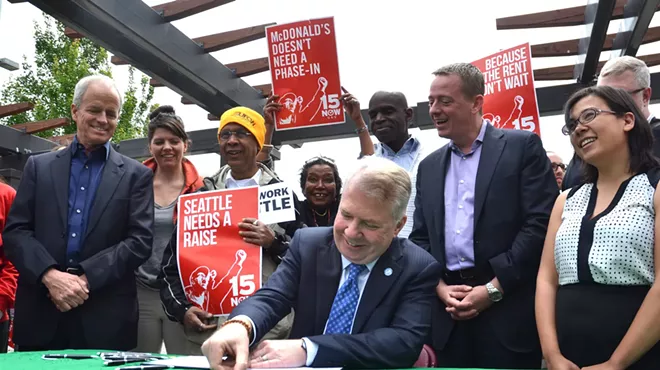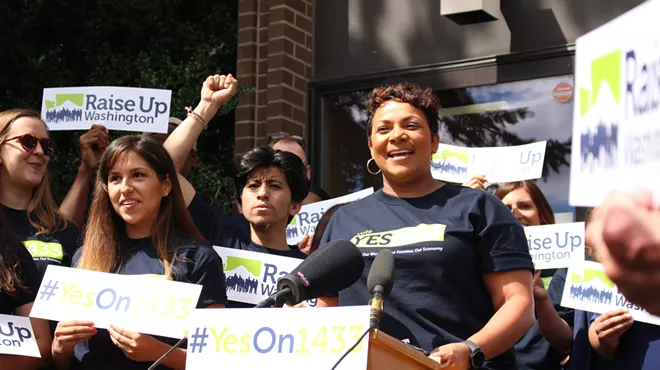The Spokane City Council meeting in January was a five-hour marathon of testimony from business owners, activists, nurses and cancer victims — capping off two years of task-force discussions, policy papers and surveys of more than 300 businesses.
But by the end the council hammered out a crucial compromise: Businesses with 10 or more employees would be required to let employees earn at least five days of paid safe and sick leave a year, while businesses with fewer than 10 employees would be required to let them earn at least three days a year. These days could be used by employees who are ill — or to take care of a sick child or address domestic violence.
The rule wouldn't apply to seasonal workers, temps or anyone in the construction industry. Startups would be given a grace period for the first year.
Yet the Friday before the council passed its sick leave policy in January, Council President Ben Stuckart says he received two phone calls — both from fervent supporters of sick leave. But they had a surprising message: They wanted him to abandon the ordinance the city council had spent more than two years debating and developing.
Stuckart declines to name names, but says they were allies of Raise Up Washington, the union-backed coalition pushing an initiative this year that would not only hike the state's minimum wage to $13.50 by 2020, it would also put into place a new, significantly more generous statewide policy guaranteeing up to seven days of sick leave a year. No exemptions, no exceptions.
Stuckart says the group was worried that Spokane's more modest policy would harm their statewide efforts. But Stuckart says he dismissed this as "silly Westside logic."
"Why would we pull this when I know we have the votes to pass a sick leave policy in Spokane, and you're asking me to pull it based on an initiative you don't know is going to pass?" Stuckart says.
But now that Initiative 1433 is on the November ballot, the city is faced with the possibility that their work will be overridden. If the initiative passes, Stuckart says, the city council would repeal its sick leave policy to avoid it conflicting with the state's. And that would eliminate the hard-won compromises and exemptions that Spokane spent so long creating.
STRIPPING AWAY THE NUANCE
Before last November's election, Councilwoman Karen Stratton struck a middle ground that earned her derision from some on both sides. She said she supported sick leave in principle, but ultimately pushed for some of the ordinance's biggest compromises, including adding a one-year grace period for new businesses.
But even though the state initiative would override those compromises, she says she plans to vote for it. Because the initiative isn't just about sick leave.
"These guys were brilliant, because they added the minimum wage [increase]," Stratton says.
If they were separate initiatives, she'd support the minimum wage hike in a heartbeat. She's less certain that she would support expanding sick leave, citing her concern about the impact on small businesses, like the mom-and-pop restaurant she visits in the tiny town of Springdale.
"You worry, how are they going to make it?" Stratton wonders. She was proud of the way Spokane's ordinance made allowances for small businesses, but doesn't want to pass up the opportunity to increase the minimum wage.
Other than the construction worker exemption, Stuckart doesn't mind losing those allowances. Overall, he sees value in the initiative's simpler statewide approach and is supporting it.
"Do we want it more confusing or do we want it simple and applying equally?"
THE PATCHWORK
Earlier this year, Stuckart and other councilmembers lambasted state Sen. Michael Baumgartner for floating a proposal to prevent local governments from making their own rules regarding wages or sick leave. It was a matter of principle.
"No city wants to have ... their ability to govern taken away," Stuckart said back then.
Now, the positions have switched: Stuckart praises the way that the initiative simplifies the patchwork of different systems across the state, while the conservative critics of sick leave requirements are lobbing complaints about a loss of local control.
"It's a one-size-fits-all proposal designed for downtown Seattle that the rest of the state can't afford to absorb," says Don Skillman, spokesman for the 1433 opposition campaign. "Initiative 1433 is poorly crafted and should be rejected so cities can choose the approach that works best for their communities."
Still, there are important distinctions. Since the initiative simply sets the minimum standards for wages and sick leave, it wouldn't necessarily erase the tangle of state and local rules. Indeed, in some areas, it would make this more complicated.
Seattle and SeaTac would still have higher minimum wages than the rest of the state. And in Seattle, the initiative would raise the standard for small businesses — but large businesses are already required to allow employees to use anywhere from 9 to 13.5 days of sick leave a year. Seattle will have to figure out how to navigate the two different sets of standards.
The only way the initiative would level the playing field, Baumgartner says, would be to make staying in business tough for everyone.
"The initiative is going to be very, very tough for the small businesses, particularly for those of us in a border community," Baumgartner says.
Barring a national wage increase, the hike would mean that Spokane County businesses would need to pay their minimum wage workers salaries more than 85 percent more than bordering Kootenai County.
Stuckart points to a recent study showing that Seattle's initial minimum wage hike only had minor negative impacts on employment and hours for low-wage workers and says he isn't concerned.
Yes, before last year's election, Stuckart said he opposed a $15-an-hour minimum wage hike. What works in expensive, booming Seattle, he argued, does not always work for Spokane. He preferred $12.
But $13.50? That's close enough, Stuckart says. He'll take it.
THE YEAR OF SPOKANE'S SICK LEAVE
Gavin Cooley, Spokane's chief financial officer, says that the city's human resources department has been in the process of analyzing the cost of hiring a new employee in order to enforce the city's sick leave policy: No matter what happens in November, starting on Jan. 1, 2017, Spokane's policy will take effect. The city of Spokane will handle all the regulations and enforcement.
But if Initiative 1433 passes, that would only last a year. Then, starting in 2018, the state would be in charge, and local businesses would have to relearn sick leave rules all over again.
In January, Mayor David Condon vetoed the city's ordinance. It was his attempt to urge caution: He argued that the city needed to take more time to deliberate on the details, and that such decisions are better left to the state. But his veto was swiftly overridden by a council supermajority, who doubted the state would act.
Today, however, Stuckart says Spokane's fast implementation was the right decision. That's one of the reasons he disagreed with those who wanted him to pause the city's efforts, and wait for the state initiative. Even another year, he argued, was too long to wait.
"For the 40,000 people who would receive sick leave in 2017, what do those people expect them to do for that whole year?" Stuckart says. ♦






















